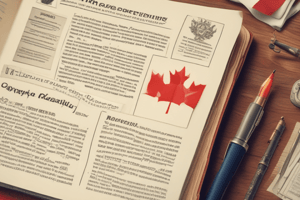Podcast
Questions and Answers
What defines a citizen?
What defines a citizen?
A citizen is a legally recognized subject or national of a state.
What rights do citizens typically have?
What rights do citizens typically have?
Citizens typically have the right to vote, run for office, and receive protection from their government.
How can one become a citizen?
How can one become a citizen?
One can become a citizen through birth, descent, or naturalization processes.
What is the difference between a citizen and a resident?
What is the difference between a citizen and a resident?
Can citizenship be revoked?
Can citizenship be revoked?
What does normative political theory focus on?
What does normative political theory focus on?
Which political theorist introduced the concept of the social contract?
Which political theorist introduced the concept of the social contract?
How does empirical political theory differ from normative political theory?
How does empirical political theory differ from normative political theory?
What major political concept seeks to understand the nature and legitimacy of political authority?
What major political concept seeks to understand the nature and legitimacy of political authority?
What is the focus of contemporary political issues like globalization?
What is the focus of contemporary political issues like globalization?
Which theorist is known for advocating individual liberty against the tyranny of the majority?
Which theorist is known for advocating individual liberty against the tyranny of the majority?
What does the term 'identity politics' refer to in the context of political discourse?
What does the term 'identity politics' refer to in the context of political discourse?
What methodology involves comparing political systems across societies?
What methodology involves comparing political systems across societies?
Flashcards are hidden until you start studying
Study Notes
Definition and Branches
- Political theory studies ideas and philosophies concerning politics and governance.
- Normative Political Theory evaluates ethical questions about justice and rights; focuses on how politics should be.
- Empirical Political Theory analyzes political behavior and institutions using data; focuses on how politics is practiced in reality.
Key Concepts
- Justice investigates fairness in social arrangements and resource distribution.
- Power examines the legitimacy, sources, and nature of influence within political relationships.
- Authority explores the justification of political power and the obligation to obey such power.
- Liberty discusses freedom, constraints, and individual rights in the context of political systems.
Major Theorists
- Plato proposed the philosopher-king model, emphasizing justice in governance.
- Aristotle emphasized empirical observations and categorized different forms of government through the concept of the polis.
- Thomas Hobbes introduced social contract theory, highlighting the need for a strong central authority for order.
- John Locke focused on natural rights and government by consent, significantly influencing liberal democracy.
- Karl Marx critiqued capitalism and advocated for a classless society through class struggle analysis.
- John Stuart Mill championed utilitarianism and individual liberty, safeguarding against the tyranny of the majority.
Contemporary Issues
- Globalization examines the repercussions of interconnectedness on sovereignty and national identities.
- Democracy vs. Authoritarianism highlights the conflict between democratic ideals and authoritarian governance.
- Identity Politics investigates the influence of race, ethnicity, gender, and sexuality on political discussions and movements.
- Environmental Politics explores the nexus between political decisions and ecological considerations, pushing for sustainable governance strategies.
Methodologies
- Analytical Philosophy aims to clarify political concepts and arguments through rigorous logical analysis.
- Historical Analysis contextualizes political ideas within their historical periods to track their evolution and impact.
- Comparative Analysis assesses various political systems and theories across different cultures to derive broader insights.
Applications
- Political theory shapes policy development and the formation of political ideologies, guiding governance frameworks.
- It encourages citizens to engage in critical thinking regarding political issues, fostering active participation in democratic processes.
Studying That Suits You
Use AI to generate personalized quizzes and flashcards to suit your learning preferences.




